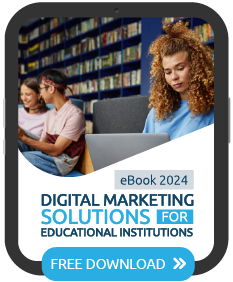In the process of boosting your online presence and marketing your college programs and university degrees, you will run into the following terms: Search Engine Optimization (SEO) and Search Engine Marketing (SEM).
Question is, what is the difference? We understand how confusing this may seem, but there are very clear differences between the two (they actually work hand in hand in many instances).
Here are the differences between SEO and SEM:
Search Engine Marketing
Search Engine Marketing (SEM) is something of a blanket term that encompasses all the marketing done on search engines, including search engine optimization and search engine advertising.
Search engine advertising involves PPA (Pay Per Action), PPC (Pay Per Click marketing) and PPI (Pay Per Impression) ad campaigns. For education marketing, PPC marketing campaigns may be the most beneficial. These involve text-based ads that appear on the right hand side of search engine results pages. The reason they are called “pay-per-click” is that you pay every time someone clicks on the ad. We should note that the ranking of these ads is determined by a combination of bid price and quality score, among other things.
The benefits of PPC Marketing include:
- Complete Control
PPC marketing is a very flexible online marketing tactic that provides complete control over budget, keywords and more. - Instant Traffic
PPC campaigns are an easy way to target specific programs, courses and faculties and this ability tends to generate traffic quickly.
One thing to keep in mind with PPC campaigns, however, is that your ads have to be properly optimized and keyword rich. If you’re not careful, you may end up targeting the wrong audience, which can burn through your budget and leave you with a low conversion rate.
For more on the benefits of SEM, check out our post on Pay Per Click Writing Tips.
Search Engine Optimization
Search engine optimization (SEO) involves a series of tactics that are both on-page and off-page that can boost the rank of a school’s website in organic search engine results page. It is a long-term approach involving keyword research, content creation, social media, press releases, link building and a host of other on- and off-page tactics.
On-page SEO tactics can involve continuously tweaking and improving:
- URLs
- Headings
- Meta descriptions
- Page titles
- Keyword-rich page text
- Alt image tags
- And more
Effective SEO campaigns require long-term dedication and monitoring, as search engine rank can improve over long periods of time.
The benefits of effective SEO include:
- Increasing your school’s reach into untapped prospective student segments
- Effectively targeting different prospective student groups, including full-time, continuing education and international students
- Improving rank in organic listings on search engines like Google, Yahoo and Bing
Still confused about SEO and SEM? Check out this image, which highlights organic search listings (SEO) and paid listings (SEM):

Any other questions regarding SEO and SEM? Let us know your thoughts and concerns.





